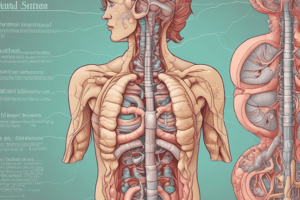Podcast
Questions and Answers
What is a common cause of chronic gastritis?
What is a common cause of chronic gastritis?
- Alcohol
- Helicobacter pylori (correct)
- Trauma with nasogastric tubes
- NSAIDs
What is the main difference between acute and chronic gastritis?
What is the main difference between acute and chronic gastritis?
- Inflammation of superficial layers of mucus membrane
- Infiltration of lymphocytes
- Infiltration of neutrophils
- Inflammation of deeper layers of mucus membrane (correct)
What is the result of chronic gastritis?
What is the result of chronic gastritis?
- Peptic Ulcer
- Acute Gastritis
- Gastric Atrophy (correct)
- Duodenal Ulcer
What is peptic ulcer characterized by?
What is peptic ulcer characterized by?
What is a common complication of chronic gastritis?
What is a common complication of chronic gastritis?
What is the name of the bacteria that causes chronic gastritis?
What is the name of the bacteria that causes chronic gastritis?
What type of stimulus can stimulate nociceptors?
What type of stimulus can stimulate nociceptors?
What type of pain is elicited by mechanical and thermal stimuli?
What type of pain is elicited by mechanical and thermal stimuli?
What are nociceptors located on?
What are nociceptors located on?
What are the ion channels called that are responsible for nociception?
What are the ion channels called that are responsible for nociception?
What is the approximate ratio of cold spots to warmth spots in the human body?
What is the approximate ratio of cold spots to warmth spots in the human body?
What is the primary function of receptors in the body?
What is the primary function of receptors in the body?
What type of receptors are responsible for detecting temperature changes in the body?
What type of receptors are responsible for detecting temperature changes in the body?
What is the most sensitive mechanoreceptor in the somatosensory system?
What is the most sensitive mechanoreceptor in the somatosensory system?
What is the density of Meissner's corpuscle receptors in the hand?
What is the density of Meissner's corpuscle receptors in the hand?
What is the function of the Ruffini ending in the somatosensory system?
What is the function of the Ruffini ending in the somatosensory system?
What is the size of the receptive fields on the fingertips?
What is the size of the receptive fields on the fingertips?
What is the difference in tactile acuity between men and women?
What is the difference in tactile acuity between men and women?
Flashcards are hidden until you start studying
Study Notes
Gastritis
- Inflammation of the gastric mucous membrane, which can be acute or chronic.
- Acute gastritis involves inflammation of the superficial layers of the mucous membrane and infiltration with leukocytes, primarily neutrophils.
- Chronic gastritis involves inflammation of the deeper layers and infiltration with more lymphocytes.
Causes of Gastritis
- NSAIDs (Non-Steroidal Anti-Inflammatory Drugs)
- Alcohol
- Factors that increase peptic activity
- Bacterial, viral, and traumatic causes (e.g., nasogastric tubes)
- Chronic gastritis is often caused by the bacterium Helicobacter pylori
Gastric Atrophy
- Result of chronic gastritis
- Characterized by the shrinkage and weakening of the stomach muscles and glands
- Leads to a deficiency of gastric juice
- Also known as Chronic Gastric Atrophy
Peptic Ulcer
- Erosion of the surface of an organ due to the shedding of inflamed necrotic tissue
- Can occur in the stomach (Gastric ulcer) or duodenum (Duodenal ulcer)
- Caused by the digestive action of gastric juice
Sensory Nervous System
- The sensory system starts from receptors, which are detectors of any changes in the body.
- Receptors are connected to dendrites, located in the dorsal spinal ganglia.
- The sensory information is transmitted to the spinal cord, CNS, and finally interpreted in the somatosensory cortex.
Types of Somatosensory Receptors
- Mechanoreceptors:
- Tactile receptors (touch, pressure)
- Proprioceptors (muscle spindle, Golgi tendon organ, joint capsule receptors)
- Nociceptors
- Thermoreceptors:
- Cold receptor (Ad fibre): 10°C to 40°C, peak 24°C
- Warm receptor (C fibre): 30°C to 49°C, peak 45°C
- Heat nociceptor (Ad fibre): stimulated when temp >45°C
- Cold nociceptor (C fibre): stimulated when temp < 5°C
- Chemoreceptors: smell, taste, and osmoreceptors (detect gases in the blood)
- Photoreceptors: rods and cones (electromagnetic receptors)
- Polymodal Receptors: nociceptors – C fibers
Tactile Receptors
- Pacinian Corpuscle: the most sensitive mechanoreceptor in the somatosensory system
- Meissner's Corpuscle: the most numerous tactile receptor in the hand, with a density of approximately 2 per mm at the fingertip
- Receptive Fields: smallest on the fingertips, averaging 11 mm for Merkel's cell fibers and approximately 25 mm for Meissner's corpuscle
- Tactile Acuity: slightly greater in women than in men, and varies between fingers but not between hands
Nociceptors and Thermoreceptors
- Nociceptors: mediate pain, can be stimulated by mechanical, thermal, and chemical stimuli
- Polymodal Nociceptors: can respond to different modalities of stimuli
- Fast Pain: elicited by mechanical and thermal stimuli
- Slow Pain: can be elicited by all three types of stimuli
- Nociceptors Location: on the ending of nociceptive nerve (free nerve ending) that mediates pain and temperature (Ad and C fibers)
- Transient Receptor Potential Channel (TRP): an ion channel that mediates nociceptors, with at least 6 types of TRP
Notes for Remembering
- In the human body, there are 3 to 10 times more cold spots (receptors) than warmth spots
- Maximum cold spots are present in the lips (15 to 25 cold spots/cm2), 3 to 5 in the finger, and less than 1 cold in some areas of the trunk
Studying That Suits You
Use AI to generate personalized quizzes and flashcards to suit your learning preferences.


